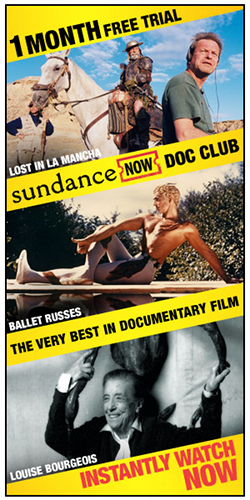Review: Sherlock Jr (1924)
Cast: Buster Keaton, Kathryn McGuire, Joe Keaton
Director: Buster Keaton
Country: USA
Genre: Comedy | Fantasy
Official Clip: Here
In the past week I’ve seen two entries in the Sherlock Holmes canon. On Monday I went to see Sherlock Holmes: Game of Shadows. I completely understand why a good portions of critics are philosophically against what Guy Ritchie and Joel Silver have done with the character. “Swashbuckling” never came to mind when I thought of the Sherlock Holmes series. The common criticism with the films is that – in addition to surprising amount of action, there isn’t enough sleuthing. Add to that Guy Ritchie’s in-your-face stylization and it’s enough to give an already grumpy critic a migraine.
As much as I understand that argument, I don’t agree with the crux of it. The Ritchie movies are hardly great films, but they are by and large successful entertainments, assuming you find Ritchie’s filmmaking style bearable (I do). I’d love to see a “real” Sherlock Holmes film as much as the next guy but in the meantime, these suffice. But this is not a review of Sherlock Holmes: Game of Shadows. This is a preface to a reminder that one of the best movies featuring the character (or a play on the character anyway) features – again – lots of action and very little in the way of sleuthing. In terms of wit and imagination, it runs circles around the Guy Ritchie films. It is, of course, Buster Keaton’s Sherlock Jr.
It’s appropriate to discuss a film other than Sherlock Jr. when discussing Sherlock Jr. since much of the action in Keaton’s film begins to take place in a film within the film, or at least a dream of a film within the film. Throughout the movie, Keaton showcases his comedic genius as the stone-faced, slapstick, sad sack icon, born with the natural gift for physical comedy. But it isn’t until Keaton’s character steps through the silver screen of a movie theater that he truly displays his mastery of the medium. He was an amazing entertainer, Buster Keaton was. But he was also one of our great filmmakers. And Sherlock Jr. is not only a very funny (not to mention very short at 44 minutes) comedy, it’s also an innovative and important thin slice of cinema with some miraculous editing and shots executed with architectural precision.
…an innovative and important thin slice of cinema with some miraculous editing and shots executed with architectural precision.
Keaton plays a projectionist at a movie theater who has aspirations to become a detective (Indeed, when we first meet him, he is reading a rather unpretentious book titled How to Become a Detective). As much as he attempts to adhere to the basic rules of detection, it does not prevent him from being framed as another suitor of his girlfriend has him set up for stealing her father’s watch. Shamed and confused, he eventually ends up back at the cinema where he falls asleep on the job (he’s not a very good projectionist). In his dreams, however, he projects himself into the lead role as Sherlock Jr. – the world’s greatest detective. In his dreams he is able to solve the crime, avoid certain death, enact revenge against his rival and win the heart of his lady. But that ain’t the half it.
This year we have had our share of directors having fun inviting audiences into the movie-making process (the most delightful example being Scorsese’s Hugo). Keaton shares this enthusiasm in Sherlock Jr. with a sequence so breathtakingly awesome I was leaning over in my seat trying to figure out how this man – nearly a hundred years ago – so expertly pulled off shots with a percentage of the technology available today. He isn’t satisfied with simply making you laugh with some clever gags here, he wants to show audiences the possibilities cinema has to offer.
He isn’t satisfied with simply making you laugh with some clever gags here, he wants to show audiences the possibilities cinema has to offer.
And then he wants to comment on how those possibilities can affect a viewer. Light-years ahead of his time, Keaton even has the nerve to question the fantasy of the big screen in a last shot worthy of comparison to Mike Nichol’s final note in The Graduate. By questioning the dream, by showing the real life consequences versus the wants and needs of the dreamer, Keaton’s film ends on something of a warning. Be careful what you wish for, Buster.
It’s been rumored Keaton got his name “Buster” from the magician Houdini when he was not yet two-years-old. This rumor has been mostly debunked, but it’s no surprise as to the sort of company Keaton kept much of his life. He is a master showman as both director and actor, every bit the magician as Houdini or Méliès. Magicians’ charm audiences and make children of grown men, forcing them to wish “Wow! Can I see that again?” I’ve watched Sherlock Jr. four times now in the past week and as irony would have it, it is the curious child in me that wants to spoil it all; that wants to read up on how so many of Buster’s magic tricks were executed. Every child wants to know what the secret is behind every trick, after all. Be careful what you wish for. The adult in me will have none of it. At least for now. And that’s the good part of growing up; having that control, enjoying the mysteries we have left. See, it’s the adult in me who still craves that sense of child-like awe. We get so little of it these days, so – at least for a little while longer – I prefer to leave well enough alone.


















 Review: Prometheus (2012)
Review: Prometheus (2012) Subversive Saturday: The Red and the White (1967)
Subversive Saturday: The Red and the White (1967) Review: Oslo, August 31st (2011)
Review: Oslo, August 31st (2011) Review: Piranha 3DD (2012)
Review: Piranha 3DD (2012) Review: Snow White and the Huntsman (2012)
Review: Snow White and the Huntsman (2012)

